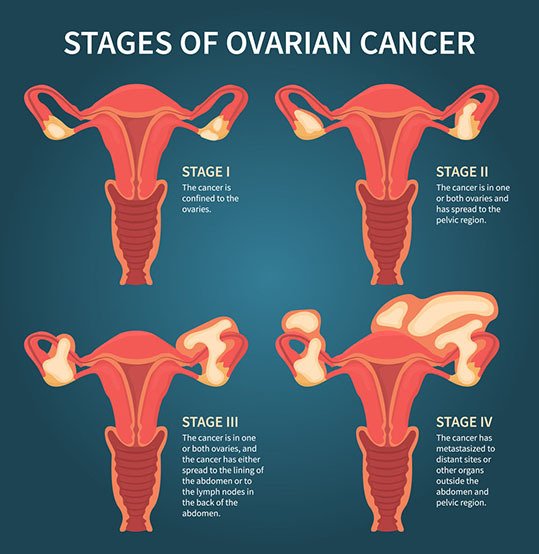Every year, around 21,000 people in the United States are diagnosed with ovarian cancer. Sadly, over half of them will die from it. This type of cancer can be difficult to detect and diagnose, particularly in its early stages. This means it’s often not caught until the cancer has already spread to other parts of the abdomen. For that reason alone, it’s more imperative than ever that women are vigilant about their personal care, learn to recognize the risk factors for ovarian cancer, and teach themselves to spot potential signs and symptoms.
Causes of Ovarian Cancer
While it’s not clear what specifically causes ovarian cancer, experts can break down precisely how the cancer begins to develop.
In general, cancer begins when a cell develops errors (mutations) in its DNA. The mutations tell the cell to grow and multiply quickly, creating a mass (tumor) of abnormal cells. The abnormal cells continue living when healthy cells would die. They can invade nearby tissues and break off from an initial tumor to spread elsewhere in the body (metastasize). (Mayo Clinic)
While experts have yet to pin down the exact causes of ovarian cancer, they have identified multiple risk factors, including:
- Age – Most women diagnosed with ovarian cancer are between the ages fifty and sixty
- Ages when menstruation started and ended – The longer someone menstruates throughout their life, the higher their risk factor for this disease
- Estrogen hormone replacement therapy – Choosing this therapy during menopause or for other reasons increases risk factors
- Family history – Having close relatives with the disease increases your risks as well
- Hereditary genetic mutations – BRCA Gene mutations inherited from parents (including BRCA1 and BRCA2) can increase the risks of both breast and ovarian cancers. Genetic tests are available to identify if you have the BRCA gene.
Those who recognize themselves on this list should stay alert in a special way to potential symptoms of ovarian cancer.

Symptoms of Ovarian Cancer
As we have already stated, ovarian cancer can often go undetected, particularly in its early stages. That’s because the signs and symptoms of ovarian cancer often manifest themselves only after the disease has spread. Furthermore, the symptoms of ovarian cancer often mimic other issues, delaying the realization that something serious could be wrong.
Potential symptoms of ovarian cancer include:
- Bloating – This is a common enough issue for most women. Many who experience bloating do not connect it to cancer.
- Pelvic and abdominal pain – Stomach and belly pain are not uncommon. Most of us do not immediately link this to anything sinister.
- Changes in periods for menstruating women – Depending on how regular or irregular your period generally is, you may not even notice this as a symptom.
- Loss of appetite and quickly feeling full – Many chalk this symptom up to hormonal changes, particularly later in life.
- Experiencing changes to urinary frequency/urgency – This also can be mistaken for a simple sign of getting older.
Because these symptoms are common and can be linked to other causes, how can you determine when they should be a matter for concern?
When they are caused by ovarian cancer, they tend to be persistent and a change from normal for example, they occur more often or are more severe. (Cancer.org)
If you are experiencing these symptoms in new and persistent ways, please contact a healthcare professional immediately.
Early diagnosis is crucial.
Ovarian Cancer Diagnosis
When screening for ovarian cancer, a doctor will likely rely on some combination of the following methods:
- Investigate your medical and family histories
- Conduct a basic physical examination
If these two steps are able to rule out other potential diagnoses, they will likely move on to the following:
- Conduct a basic pelvic exam – They will check the size, shape, and condition of the ovaries and look for irregularities such as inflammation or fluids where they shouldn’t be.
- Imaging tests – Because it’s rare to detect ovarian cancer through a pelvic exam, doctors will then likely an ultrasound, biopsy, CT scan, MRI, and/or PET scans to capture images of the organs and tissues.
- Blood tests – Elevated levels of various markers can help lead doctors to a more certain diagnosis. The tests they order will depend in part on the type of cancer they suspect.
Though there may be some additional testing involved, these are the most common methods by which doctors test to determine whether a patient has ovarian cancer.
Typical Treatments for Ovarian Cancer
When someone is diagnosed with ovarian cancer, thetreatment plan put in place for them will depend in part on the type and stage of the cancer, among other factors. While some patients will require immediate surgery, others may receive chemotherapy, radiation treatments, or hormone therapy in an attempt to destroy the cancer cells. Many patients will undergo come combination of these treatments.
One thing is certain: when it comes to treatments for ovarian cancer, the sooner the cancer can be detected, the greater the chance that the treatments will be effective.
This is why it’s so important not to ignore warning signs.
If I’m Concerned about Ovarian Cancer
If you’ve read the symptoms and risk factors for ovarian cancer and walk away feeling concerned, the best thing you can do is make an appointment as soon as possible with a healthcare professional.
Though most of us would like to avoid making doctor’s appointments when possible, considering the serious nature of ovarian cancer and the risks and rewards involved in an early diagnosis, it’s in your best interest to make that appointment right away.
Contact The Women’s Clinic In Jackson, MS
While no one wants to think about the possibility of ovarian cancer, early diagnosis and treatment can make a big difference. If you’re concerned about ovarian cancer, be proactive and seek testing as soon as possible.
If you have questions or concerns about ovarian cancer, or if you would like to talk about any other health needs or questions, please feel free to contact us here at The Women’s Clinic. We can help at any of our two locations in Jackson and Madison, MS
We look forward to meeting you, answering your questions, and serving you in any way necessary. Schedule your appointment with us today!



 Close
Close